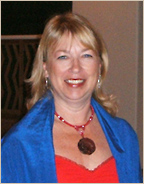Vital Voices was started in 1997 by then-First lady Hillary Rodham Clinton and former Secretary of State Madeleine Albright after the UN’s Fourth World Conference on Women in Beijing to promote the advancement of women as a US Foreign policy goal. It is the preeminent non-governmental organization (NGO) that identifies, trains and empowers emerging women leaders and social entrepreneurs around the globe, enabling them to create a better world and providing these women with the capacity, connections and credibility they need to unlock their leadership potential. In June 2000 Vital Voices Global Partnership was created as nonprofit. Besides Senator Clinton (D-NY), the other two honorary co-chairs are Senator Kay Bailey Hutchison, (R-TX) and Nancy Kassebaum Baker, former US Senator (R-KS). For more, go to www.VitalVoices.org.
I have spoken at conferences for Vital Voices before, including leadership conferences for Latin American women in Miami, FL, African women in Capetown, South Africa (2007), and Eura-Asia women in Kiev, Ukraine (2007).
My first day here in Kenya I attended a “Women’s Business Forum” which reminded me a lot of WIPP (Women Impacting Public Policy). The WBF (www.womensbusinessforum.org) is sponsored by Vital Voices and The Gates Foundation. My good friend here, Eva Muraya, put the program together.
About 20 leading women entrepreneurs in Kenya trained in advocacy skills to enable them to face up the challenges of engaging stakeholders so that policies and legal barriers can be changed to create a more enabling and level economic playing field for women.
The main objective of WBF is to improve the quality of lives among women and to secure the rights and opportunities for women in business, governance and leadership positions. This will be realized through the following specific objectives:
1. to enhance women’s participation in policy making process
2. To impart gender advocacy skills among emerging women leaders
3. To establish increased access to finance for women entrepreneurs
4. Gender mainstreaming of government projects, financial services providers, corporate governance and legal
structures.
Advocating for “economic” issues has never been discussed before, they said. Advocacy here is generally acout human rights so the idea of economic empowerment and advocacy is a first.
The speakers lined up were extremely impressive. Jane Kiragu, Managing Director of Satima Consultants Ltd, organized the seminar with Eva. She is a lawyer and an advocate of the High Court of Kenya. She is a household name in Kenya and has over 18 years of experience in human rights law, lobbying, research, training, facilitation, evaluations, operational management and legal work. She said there are five fluid stages of advocacy: issue identification, developing solutions, awareness building (building political support), policy action and evaluating the policy.
An icon in Kenya politics is Mrs. Rose Waruhiu, a former member of Parliament. Her public service career spanned 35 years. She served as a fellow at IOP Kennedy School of Government at Harvard University.
Betty Murungi, Director of the Urgent Action Fund in Nairobi, talked about “trading up” your advocacy. She has a degree in law and was a fellow at the Harvard Law School’s Human Rights Program in 2005-2006. She has extensive experience in the Human Rights of Women and was awarded the international Advocate for Peace Award by the Cardozo Law School in New York.
She drew a spiral with “me and mine” in the middle. As the spiral unfolds is the “team” or your “company/business.,” The next part of the cycle is community and then policy change, followed by regional, national and global. After global is social entrepreneurship. She calls the inner part the “me, me, me. You will always revert back to this if you go through a divorce, your spouse dies—we tighten up. If we’re here, we go around in circles and someone else controls your life.” But if you continue progressing in advocacy, you eventually go global and become a social entrepreneur.
It was a fascinating day, hearing a different culture discuss advocacy and seeing how much work there is for all of us to do in research (thank goodness for the Center for Women’s Business Research in the U.S.!) and advocacy. And thank goodness for WIPP that has gotten us so far down the road in the U.S.!
I’ll be up early tomorrow morning for the First Annual Women Mentoring Women (WMW) Walk.
 The WMW walk is an annual event that will be held in 15 countries around the world including Kenya.. It is an initiative of the Vital Voices-Fortune 500 Mentorship program alumni around the world. It is an exciting opportunity to pay it forward.
The WMW walk is an annual event that will be held in 15 countries around the world including Kenya.. It is an initiative of the Vital Voices-Fortune 500 Mentorship program alumni around the world. It is an exciting opportunity to pay it forward.I will not have a mentor there, but the 500 expected attendees will be teams of seasoned entrepreneurs and young women ages 21-30. While walking the 1.5-2 kilometers, the women will share wisdom and experience in the areas of leadership, character and social etiquette. For more info go to
http://storymojaafrica.co.ke/main/events/first-annual-women-mentoring-women-walk/ or come back here tomorrow when I report on the walk! Time for bed—its been a tough day to stay awake!


No comments:
Post a Comment